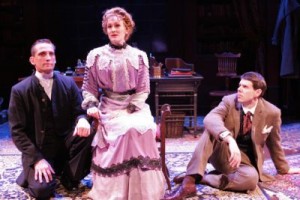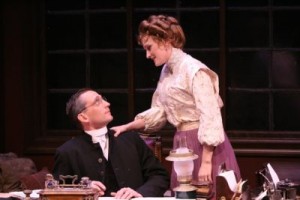RECOMMENDED
Candida, George Bernard Shaw’s romantic comedy classic, has just opened at the Colony Theatre, and it’s hard to imagine a better production than the one directed by Kathleen F. Conlin.
That being said, Candida is a very talky play, and far less plot-driven than other Shaw comedies I’ve seen or reviewed. It wasn’t until the third act that Candida really ignited for me, through no fault of the superb cast assembled by Conlin or the impeccable performances they each give.
When the lights go up on St. Dominic’s Parsonage in the northeast of London, we meet the Reverend James Morell (Mark Deakins) and his typist, the very efficient Prosperpine (Kate Hollinshead) discussing Morell’s schedule for the day. “Prossy” soon ushers in Burgess (Matthew Henerson), Morell’s slightly crooked businessman father-in-law who tries to convince Morell that he is a new man, having given his underpaid workers raises (though not for altruistic reasons). Burgess’s Cockney accent reveals his humble origins, making it a bit of a surprise when his daughter, the entirely upper-class (pronounce that “uppa-clahss”) Candida (Willow Geer), arrives.
Candida is not alone. She has brought along with her an 18-year-old poet named Eugene Marchbanks (Johnathan McClain), a young man whom Morell has recently rescued from the streets. Later in Act 1, the other characters having departed, Eugene informs the Reverend that he is in love with Candida. Not only that, but Eugene also tells Morell that the latter is nowhere near good enough for his incandescently beautiful wife.
As Act 1 transitions into Act 2, the characters talk, and talk some more until Morell conceives of a way to test Candida’s love.
Then, following intermission, comes the sparkling, laugh-filled third act which pits the two men against each other in a “fight to the finish” to see which one Candida will choose, the callow, infatuated, entirely adorable teen, or the more settled, stable man she consented to marry some years before. Candida’s decision, and her reasons for it, may surprise you.
The Colony revival is a textbook example of how great direction can make a play even than what is on the printed page. Actors do not create their performances (and their stage “business”) in a vacuum, and in a production like this one, what one sees is the end result of the symbiotic relationship between a director and her cast.
This is never clearer than in the sparkling, enchanting work of McClain as Marchbanks. Shaw describes Marchbanks as “a strange, shy youth of eighteen, slight, effeminate, with a delicate childish voice, and a hunted and tormented expression and shrinking manner that show the painful sensitivity of very swift and acute apprehensiveness in youth.” McClain, possibly the best Gentleman Caller I’ve ever seen in a production of The Glass Menagerie, makes Marchbanks a bundle of manic energy always about to burst with youthful impetuosity. At times a puppy dog with a rapidly wagging tail, at times a petulant child, at times an arduous suitor simply exploding with love, McClain gives the kind of tour de force performance which provokes a “You can’t take your eyes off him.” (And the actor somehow persuades us that he is a good ten or more years younger than his chronological age.)
McClain’s ebullience finds its perfect contrast in the performances of Geer and Deakins. Geer is the epitome of charm, grace, and elegance, totally convincing whether teasing her husband, or giving him a pep talk, or chastising her youthful admirer. Deakins is equally fine as Morell, showing us (in Shaw’s words) his “pleasant, hearty, considerate manners.” Outwardly stuffy yet passionate and needy at heart, Deakins’ Morell makes for a great contrast to McClain’s Marchbanks, rendering Candida’s decision all the more difficult.
Henerson is very funny indeed as Candida’s father, a more successful “cousin” of Alfred Doolittle, Eliza’s father in Pygmalion, aka My Fair Lady. Simply listening to the way Henerson inserts an “h” before almost any word beginning with a vowel, and drops his h’s everywhere else is a treat. Real-life Englishwoman Hollinshead is all pert and fussy fun as Prossy (and a delight when tipsy from champagne). Gabriel Diani completes the cast, effectively, as the Reverend Alexander “Lexy” Mill, Morell’s enthusiastic young assistant.
Design elements are the usual Colony best, beginning with scenic designer Michael C. Smith’s finely detailed parsonage, to Sherry Linnell’s elegant late 19th Century costumes, to Drew Dalzell’s sound design, punctuated by music which proves a perfect fit to Shaw’s wit. Donna Ruzika’s lighting design is a textbook example of how great lighting can enhance a play’s mood. Where a less imaginative designer would simply have begun each act with lights up and forty-five minutes later lights down, Ruzika makes subtle shifts to direct the audience’s attention here or there, and the final fadeout is a stunner.
Finally, after three seasons of Colony productions with casts ranging from one to four actors, it’s an honest-to-goodness thrill to see the Colony stage filled with six characters played by six different performers. If only economic realities would allow more of these larger cast productions…
Though not my favorite of the Shaw plays I’ve seen, Candida does provide two hours of witty, intelligent talk (if sometimes a bit too much of it for my tastes), and even better, some terrific acting and direction, and one performance in particular that is sure to be remembered come “Best Of 2008-9” time.
Colony Theatre, 555 North Third Street, Burbank.
www.colonytheatre.org
–Steven Stanley
February 7, 2009
Photos: Michael Lamont




 Since 2007, Steven Stanley's StageSceneLA.com has spotlighted the best in Southern California theater via reviews, interviews, and its annual StageSceneLA Scenies.
Since 2007, Steven Stanley's StageSceneLA.com has spotlighted the best in Southern California theater via reviews, interviews, and its annual StageSceneLA Scenies.







 COPYRIGHT 2025 STEVEN STANLEY :: DESIGN BY
COPYRIGHT 2025 STEVEN STANLEY :: DESIGN BY